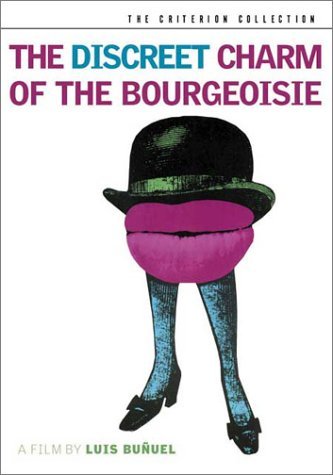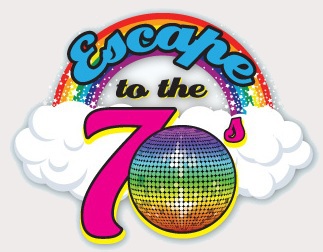The Discreet Charm Of The Bourgeoisie – 1972
 Director
Director
Luis Buñuel (as Luis Bunuel)
Writers
Luis Buñuel (as Luis Bunuel)
Jean-Claude Carrière
Producer
Serge Silberman producer
Cast
Fernando Rey – Don Rafael
Paul Frankeur – M. Thevenot
Delphine Seyrig – Mme Thevenot
Bulle Ogier – Florence
Stéphane Audran – Alice Senechal (as Stephane Audran)
Jean-Pierre Cassel – M. Senechal
Julien Bertheau – Mgr Dufour
Milena Vukotic – Ines
Maria Gabriella Maione – Guerilla
Claude Piéplu – Colonel
Muni – Peasant
Pierre Maguelon – Sgt de police
François Maistre – Delecluze
Michel Piccoli – Ministre
Ellen Bahl
Christian Baltauss
Olivier Bauchet
Robert Benoît
Anne-Marie Deschott
Jean-Michel Dhermay – (as Michel Dhermay)
Georges Douking – Jardinier
Jean Degrave
Sébastien Floche
François Guilloteau
Claude Jaeger
Jean-Claude Jarry
Pierre Lary
Robert Le Béal – Couturier (as Robert Le Beal)
Alix Mahieux
Bernard Musson – Serveur
Maxence Mailfort – Sergent qui raconte ses rêves
Robert Party
Jean Revel
Jacques Rispal
Amparo Soler Leal – (as Amparo Soler-Leal)
Diane Vernon
Review by Gary F Taylor
Charme discret de la bourgeoisie, Le (1972)
Dinner Is Served
Director Luis Bunuel is often described as a surrealist, but the word misapplied in reference to his later works, where the the term absurdism is much more appropriate. Such is the case with the Academy Award-winning THE DISCREET CHARM OF THE BOURGEOISIE, which begins with four friends who arrive at their hosts’ home only to discover they have arrived on the wrong night–a plausible situation. But before the film has run its course, Bunuel unravels his tale of a meal that never quite happens in the most unexpected ways imaginable.
The film works on several levels, mocking social conventions, the church, and eventually spilling its action into a series of overlapping nightmares in which various attempts to dine are frustrated by everything from the corpse of a restaurant manager in a nearby room to military maneuvers. On one memorable occasion, the friends are invited to dine and are seated around an elegant table–when a curtain suddenly rises behind them and reveals them to be seated on a stage before a hostile audience!
The cast (which features Fernando Rey, Delphine Seyrig, Paul Frankeur, Bulle Ogier, Stephane Audran and Jean-Pierre Cassel as the constantly frustrated diners) plays with considerable aplomb, performing the most irrational scenes with a magnificent realism. When combined with Bunuel’s absurdist story, the result is a disquieting yet often very funny discourse on frustrated appetites both real and imagined, and with many layers of incidental meaning along the way.
A word of caution to the uninitiated: Bunuel is not for those who seek a tidy plot line with clear-cut meanings. But if you come to it with an open mind, you’ll find plenty of food for thought!
Review by Jack Gattanella
Charme discret de la bourgeoisie, Le (1972)
Surprising, rather cool surrealistic satire from Bunuel,
Luis Bunuel, and his occasional collaborator Jean-Claude Carriere, present us with six core characters in France, including Spaniard diplomat Don Raphael Acosta (Bunuel regular Fernando Rey, in a performance that can be certainly said fits perfectly with his character traits), the Thevenots (Paul Frankeur and Delphine Seyrig), the Senechals (Stephane Audran and Jean-Pierre Cassel), and Florence (Bulle Ogier), along with several supporting/side characters like a bishop who decides to be a gardener for the Senechals, a colonel, a cavalry lieutenant, a “bloody” sergeant, and a cute girl handing out mechanical dogs.
The six core characters, we soon figure out, aren’t going to give us any important information about their pasts (excepting minor notes of interest in brilliantly appropriate banal dialog), and beneath their elegance within their class of life are like us, sexual beings, hungry for food, and have the sort-of side jobs going that keep the money coming in (i.e. the cocaine).
The main characters, if displayed in their daily routines for the course of the film, wouldn’t hold the audience’s attention long enough, and while Bunuel is famous for poking fun at the upper class, he knows even if he tried for a basic, true view of these people it would get boring, perhaps unbearable to the wrong viewer. However, he counter-acts this in the best he can, the way he knows how- he uses a technique in which the characters are often getting interrupted, in their meetings for dinner or other minor daily routines, by odd, obscure, mysterious, yet certainly human personalities that bring the viewer into the realm of intrigue and poetic artistry.
Therefore, because Bunuel happens to have something of a fascinating with a Freudian approach to movie-making that can never pander to the audience (unless they’re an overtly dense or stupid audience), after a while these characters walks of life become truly Bunuel-esque vignettes. Whether they’re dream or reality becomes secondary, though not irrelevant, to the effect of our immersion is to the material, the images. Such images, like the ones in successful surrealist-student works like Eraserhead, Week-End, Natural Born Killers, and even Freddy Got Fingered, stay with us for days after the credits fade to black.
The Discreet Charm of the Bourgeoisie is the second feature I have seen from the legendary surrealist writer, artist, sound man, and director Bunuel (the first was Un Chien Andalou, practically a pre-requisite in order to get into the catalog of his career), and I can tell right away that when I begin delving into his other works I’ll have a lot to look for. Indeed, from my perspective, this is a hard act to follow, and it could be the quintessential Bunuel picture (in other words, a most recommended choice) unless I see something else of his that gives me greater respect. I’m sure in a couple of months or so I’ll have my foot in my mouth over that sentence considering his works Belle De Jour and Nazarin are as equally acclaimed and revered.
One thing I can’t deny, this is an assured (European) masterpiece that will keep audience members either begging for more, or disgusted to the point of burning the video or DVD (even if they rented it from the store!)- and since that facet is one of the basic foundations of the surrealism movement, which many say never took off as it should have, this film is like a time capsule of the finest caliber of the remains of the movement. Let me put it this way: I believe this may get on my list of all-time favorites (1-50) soon enough. A++






Have Your Say.....
If you have any information or thoughts on this page, please help us by popping them in the comment box below.